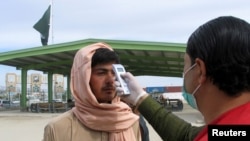Pakistan announced Saturday it will briefly reopen the border with Afghanistan early next week to allow an unspecified number of stranded nationals of the neighboring country to return home.
The coronavirus outbreak prompted Islamabad to seal borders with all neighboring countries last month in a bid to limit the regional spread of the disease.
The abrupt border closure prevented Afghan visitors from returning home. They include patients seeking better medical treatment in Pakistan, traders, visitors meeting relatives and attending wedding ceremonies and refugee communities, housing around three million Afghan refugees and economic migrants.
The Pakistani Foreign Ministry, in a statement, cited a “special request" by the Kabul government and “humanitarian considerations” for reopening the main border crossings of Torkham and Chaman for four days starting Monday to allow the exit of Afghan nationals.
“As a neighbor and in view of fraternal bilateral relations, Pakistan remains in abiding solidarity with the people of Afghanistan, particularly at this time of global pandemic,” the statement stressed.
The number of confirmed COVID-19 cases in Pakistan stood at more than 2,700 as of Saturday, with at least 41 deaths.
Afghan COVID-19 cases
In Afghanistan, the Ministry of Public Health reported 25 new coronavirus cases Saturday, raising the national tally of infections to 300 and the number of deaths to at least seven.
Afghan and U.N. officials say the western city of Heart, on the border with Iran, is the most affected part of the country, with more than 200 confirmed cases, including dozens of health workers.
Almost all the Afghan cases are said to be nationals returning from Iran, one of several countries worst-hit by the deadly virus.
Iran, which hosts several million Afghan refugees and economic immigrants, has reported more than 3,600 deaths and at least 56,000 confirmed cases of COVID-19.
The Iranian outbreak prompted more than 150,000 Afghans, including deportees, to return to Afghanistan in the last month alone, according to the International Organization for Migration.
That has raised fears the actual number of coronavirus cases could be much higher.
Afghan officials acknowledge the low rate of testing suspected patients due to capacity challenges may account for the relatively low number of confirmed cases, given the high number of people crossing the border from Iran.
Pakistan to Reopen Border for Afghan Visitors Stranded Due to COVID-19 Closure
- By Ayaz Gul




